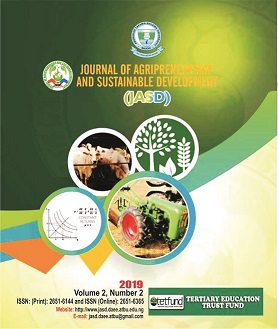FACTORS INFLUENCING THE ADOPTION OF IMPROVED PINEAPPLE PRODUCTION PRACTICES IN EDO STATE, NIGERIA
DOI:
https://doi.org/10.59331/jasd.v2i2.92Keywords:
Adoption, Constraints, Delta State, Improved pineapple, Production practicesAbstract
The study focused on the factors influencing the adoption of improved pineapple production practices in Edo State, Nigeria. Data were collected from 80 respondents selected across two agricultural zones in the State. Data were analyzed using frequency count, percentage and mean while Chi-square was used to analyze the hypothesis. The results showed that majority (62.25%) of the respondents were male, belonged to the modal class of 40-45 years, married (45.0%) and educated (61.2%). A higher proportion (45.0%) of the respondents operated a farm size of 3-4 hectares, earned an income range of ₦70,000- ₦79, 000 per annum (22.5%) and belonged to association (73.8%). Factors such as cost of innovation (mean = 2.85), relevance of innovation (mean = 2.77), availability farm inputs associated with the technology (mean = 2.68), timeliness (mean = 2.68), source of the technology (mean = 2.56), cultural acceptability (mean = 2.42) and compatibility with the exiting practices (mean = 2.40) were important factors affecting the adoption of improved pineapple production in the study area. Constraints such as inadequate credit/finance (mean = 3.60), unavailability of improved seeds (mean = 3.46), pest and disease problems (mean = 3.44), labour shortage (mean = 3.44), high cost of farm chemicals (mean = 3.44), land procurement problem (mean = 3.42), inadequate transportation facilities (mean = 3.41), seed procurement problems (mean = 3.41), insufficient preservative/storage facilities (3.36), poor market (mean = 3.33), lack of technical know-how (mean = 3.30), insufficient irrigation facilities (mean = 3.23) and inadequate extension services (3.18) were the major constraints affecting the adoption of improved farm practices in pineapple production. The chi-square result revealed that significant relationship existed between respondents’ sex (χ2 = 5.00), marital status (χ2 = 38.125), level of formal education (χ2 = 21.500), farming experience (χ2 = 31.475), household size (χ2 = 8.450), farm size (χ2 = 27.100), income (χ2 = 25.300), membership of association (χ2 = 18.050) and the adoption of improved farm practices in pineapple production. It was concluded that pineapple production in the study area is constrained by several factors which are capable reducing farmers’ productivity and possibly force them out of production. The study recommends that relevant extension agencies should link farmers with sources of farm inputs and possible of funds.
Downloads

Downloads
Published
How to Cite
Issue
Section
License
Copyright (c) 2022 Journal of Agripreneurship and Sustainable Development

This work is licensed under a Creative Commons Attribution 4.0 International License.






